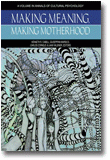
Making Meaning, Making Motherhood
Edited by:
Kenneth R. Cabell, Clark University
Giuseppina Marsico, University of Salerno
Carlos Cornejo, Pontificia Universidad Católica de Chile
Jaan Valsiner, Niels Bohr Professor of Cultural Psychology, Aalborg University
A volume in the series: Annals of Cultural Psychology. Editor(s): Giuseppina Marsico, University of Salerno. Jaan Valsiner, Niels Bohr Professor of Cultural Psychology, Aalborg University.
Published 2015
This volume is the firstborn of the Annals of Cultural Psychology-- a yearly edited book series in the field of Cultural Psychology. It came into being as there is a need for reflection on “where and what” the discipline needs to further develop, in such a way, the current frontiers and to foster the elaboration of new fruitful ideas.
The topic chosen for the first volume is perhaps the most fundamental of all- motherhood. We are all here because at some unspecifiable time in the past, different women labored hard to bring each of us into this World. These women were not thinking of culture, but were just giving birth. Yet by their reproductive success—and years of worry about our growing up—we are now, thankfully to them, in a position to discuss the general notion of motherhood from the angle of cultural psychology. Each person who is born needs a mother—first the real one, and then possibly a myriad of symbolic ones—from “my mother” to “mother superior” to “my motherland”. Thus, it is not by coincidence if the first volume of the series is about motherhood. We the editors feel it is the topic that links our existence with one of the universals of human survival as a species.
In very general terms what this book aims to do is to question the ontology of Motherhood in favor of an ontogenetic approach to Life’s Course, where having a child represents a big transition in a woman’s trajectory and where becoming (or not becoming) mother is heuristically more interesting than being a mother. We here present a reticulated work that digs into a cultural phenomenon giving to the readers the clear idea of making motherhood (and not taking for granted motherhood). By looking at absences, shadows and ruptures rather than the normativeness of motherhood, cultural psychology can provide a theoretical model in explaining the cultural multifaceted nature of human activity.
CONTENTS
Dedication. Introduction to the Annals of Cultural Psychology. The Focus of the Frontier in Cultural Psychology: Cultural Arenas for Better Understanding Meaning Making Processes, Kenneth R. Cabell. Introduction to First Volume. 1. Motherhood: A Cultural Arena for the Meaning-Making Process, Carlos Cornejo, Jaan Valsiner and Giuseppina Marsico. Introduction to the Motherhood Project. 2. Making Meaning, Making Motherhood: An Introduction to the Motherhood Project, Ana Cecilia Bastos and Milton Almeida. A Personal Account of Motherhood. 3. Motherhood and Becoming: The Construction of Motherhood Through Pregnancy and Birth, Lilia Juarez. Motherhood, Metaphors, Models, and Methods. 4. The Tree of Life Developmental Trajectory Model, Sara Chaves. Building New Constructs: How Can We Create General Concepts from Particular Experiences? 5. The Experiences of Women Who Become Mothers While Diagnosed With HIV: Conceptualizing the Isolation Cycle, Renata Moreira da Silva. 6. The Experience of Voluntary Childlessness: Conceptualizing a Semiotic Theory of Resistance in the Face of Strong Social Norms, Sara Chaves. 7. The Experiences of Mothers From the Railroad Suburb of Salvador-Bahia: Conceptualizing a Semiotic Theory of Protection and Empowerment in Adverse Conditions, Lilian Perdigão Caixêta Reis and José Eduardo Ferreira Santos. 8. Commentary: Beyond Stigma: Critical Approaches to Violations of the Motherhood Narrative, Kathryn E. Frazier, Theresa E. Jackson and Heather Mangione. 9. The Experiences of Women After the Early Loss of a Child: Conceptualizing a Semiotic Theory of Coping and Mourning, Ana Clara Bastos, Brena Carvalho, and Marianna Medrado. 10. The Experience of Recurrent Gestational Losses: Semiotic Strategies of Dynamic Self-Repair After Sequential Ruptures, Vívian Volkmer Pontes. 11. Signs of Confrontation: Ruptures in Family Dynamics and in the Education of Immigrant Mothers, Maria Virgínia Machado Dazzani and Marilena Ristum. 12. Commentary: Rupture and Maintaining of the Transition to Motherhood, Yoriko Okamoto. 13. The Experience of Maternal Participation in the Identity Dynamics of Intersexual Individuals: Conceptualizing a Semiotic Theory of Dynamic Gender Stability, Ana Karina Canguçú-Campinho. 14. Transitioning Between Personal and Collective Worlds: How Agency Emerges in the Transition to Motherhood, Roberta Takei. 15. “I-Mother the Caregiver”: How a Strong Sign Persists Through Semiotic Self-Scaffolding Along Life Transitions, Ana Cecília Bastos, Ana Karina Santos, Sandra Meneses and Julianin Araujo Santos. 16. Manifold Catalyzers: Simultaneous Different Functions of Signs in the Systemic Causality Model, Márcio Santana da Silva. 17. Symbolic Motherhood: Exploring the Creation of Semiotic Binders that Integrate Personal and Collective Meanings, Elsa de Mattos and Antônio Marcos Chaves. 18. Commentary: On Catalysts, Binding, Synthesis, Integration, Rafaelle De Luca Picione. Developing the Concepts Further: How Can We Synthesize Concepts to Construct a General Framework for Motherhood? 19. Synthetic Commentary: Trajectories of Motherhood, Tania Zittoun. 20. Synthetic Commentary: Mothers and Others: The Cultural Construction of Obvious and Obscure Identities, Nandita Chaudhary. General Conclusion. Meaning Making and Motherhood: What Cultural Psychology Can Provide, Carlos Cornejo, Jaan Valsiner and Giuseppina Marsico. About the Authors.
-
Paperback978-1-68123-140-2
Web price: $62.04 (Reg. 72.99)
-
Hardcover978-1-68123-141-9
Web price: $89.24 (Reg. 104.99)
- eBook978-1-68123-142-6

- PSY000000 - PSYCHOLOGY: General
- PSY031000 - PSYCHOLOGY: Social Psychology
- EDU037000 - EDUCATION: Research
-
 (Re)Envisioning Social Studies Education Research
Current Epistemological and Methodological Expansions, Deconstructions, and Creations
(Re)Envisioning Social Studies Education Research
Current Epistemological and Methodological Expansions, Deconstructions, and Creations
-
 Cultural Psychology in Communities
Tensions and Transformations
Cultural Psychology in Communities
Tensions and Transformations
-
 Digital Developments
Perspectives in Psychology
Digital Developments
Perspectives in Psychology
-
 I Activate You To Affect Me
I Activate You To Affect Me
-
 Intimacy
The Shared Part of Me
Intimacy
The Shared Part of Me
-
 Ordinary Things and Their Extraordinary Meanings
Ordinary Things and Their Extraordinary Meanings
-
 Qualitative Research With Diverse and Underserved Communities
Qualitative Research With Diverse and Underserved Communities

